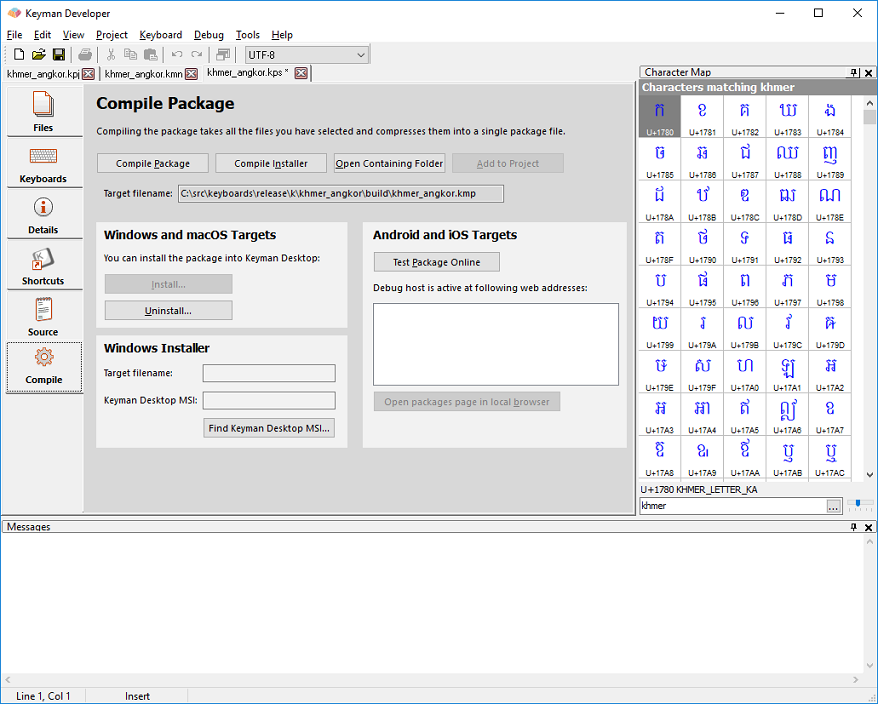Step 6: Compiling, testing and distributing a Package
In the Package Editor, click on the Compile tab.

Click Compile Package to compile the package into a .kmp file. Compiling takes all the files listed for the package, compresses them (using a .ZIP-compatible format) and adds the package information, all into a single file. If any files are not available, an error will be listed in the Messages window.
After compiling, you can test the package installation in Keyman Desktop, by clicking Install Package. You should test that all the keyboards and fonts install successfully, that the Readme and Welcome files are displayed during the install, and that the documentation is accessible to the end user. Make sure that the On Screen Keyboard installs with your keyboards, and that the shortcuts are correctly listed and working in the Start Menu.
Advice
The distribution model for Keyman keyboards is changing. We now recommend distributing source for keyboards through the Keyman Cloud Keyboard Repository. The instructions here remain, but the binary distribution model is deprecated.
Distributing a package on the Keyman Cloud Keyboard Repository
Once you have tested the package to your satisfaction, it is time to distribute it. We recommend uploading your keyboard package to the Keyman Cloud Keyboard Repository
Distributing a package on your own website
If you distribute a package on your own site, we have the following recommendations:
- Ensure the MIME type on the web server or folder for .KMX and .KMP files is set up to application/octet-stream. Without this, .KMP files may be recognised as .ZIP files -- this is not helpful to the end user as it will be opened in the wrong application. If you can't make this change, consider hosting the keyboard package on the Tavultesoft website to make things easier for your end user.
- Avoid putting the .KMP file in an archive (e.g. .ZIP) or self-expanding archive (.EXE) - this makes it harder for end users to install. A .KMP file is already compressed (it is actually just a ZIP archive file!) and you won't save much space by recompressing it.
- Include a link to the Keyman download page:
http://keyman.com/desktop/
Distributing a package by email
Attaching the KMP file directly to an email may be blocked for security reasons. As mentioned above, a KMP file is basically a ZIP file and mobile keyboard data is in JavaScript, this is a combination that looks suspicious to many email servers. You can upload it to a Google drive, and email a link for downloading the file
You may need to do some exploring to get your mobile device to load the keyboard from the KMP file into Keyman. The device may not open the file directly, claiming it is an unrecognized type. If you look for other options to open the file, hopefully you can get it to Keyman. For example, in iOS, I had to tap on the three dots to the right, then choose "Open in" and then I could choose "Copy to Keyman." In Android, I had to download the file to my device, then open the KMP file in a file manager before I could install it in Keyman.




